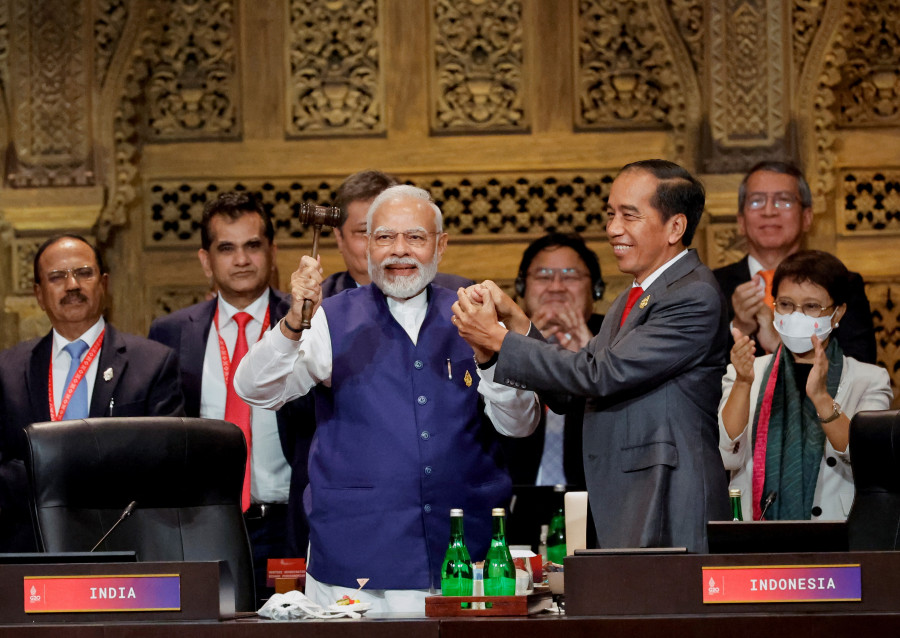
India assumed the presidency of the Group of Twenty (G20) on December 1 for a one-year term with the theme of “Vasudhaiva Kutumbakam” or “One earth, one family, one future”. The theme underlines the interconnectedness of the world that we are living in as the issues are global. The G20 has three distinct tracks that encapsulate wide-ranging issues that are of significance. The financial track would put emphasis on issues like global macro economic policies, infrastructure financing, international financial architecture, financial inclusion, health finance, international taxation and financial sector reforms. There is a Sherpa track focussed on 12 work streams and includes important issues like digital economy, employment, environment and climate, education, energy transition, health, trade and investment, and tourism. The agenda also includes engagement with the private sector, civil society, regional and international bodies. Importance is also given to multilateral reforms for inclusive, equitable and sustainable growth.
As president of the G20, India can play a leading role in shaping debates on issues that are increasingly becoming important for development and growth. Some of the issues that are more relevant to the South Asia region are discussed. Climate change-induced disasters have made global citizens aware of future risks.
Most South Asian countries use fossil fuels to generate energy. According to a 2021 World Bank report, greenhouse gases generated through energy production account for 63 percent of regional emissions. The rising price of petrol has made it difficult for countries to keep pace with energy production as dollars have become short in supply. In Bangladesh, 70 percent of its electricity is produced using liquefied natural gas (LNG), whereas India uses coal to produce around 70 percent of its electricity requirement. A transition to green energy is very much high on the agenda of the governments of this region.
Green energy
Renewable energy will get a boost with India heading the G20. Wind and solar energy will be game changers in the region. The International Solar Alliance counts most South Asian countries among its members. Solar energy will help in the green energy transition to advance sustainable development that also takes into consideration concerns related to climate change. Most of the region's countries are also vulnerable to climate change-induced natural disasters that have displaced millions. According to the World Bank, 750 million people in this region have been affected by at least one climate disaster in the last two decades.
South Asian countries—especially Nepal, Bhutan and India—are endowed with hydropower. Governments here are concerned with providing electricity to households as one of the basic measures of governance. In the last few years, India has been focussing on connecting cross-border electricity grids and building new transmission lines within the framework of Bangladesh-Bhutan-India-Nepal (BBIN) sub-regional cooperation. Cross-border pipelines like the Siliguri-Parbatipur and Motihari-Amlekhgunj pipelines are some of the projects that have been implemented to enhance energy cooperation. Bhutan is poised to produce nearly 10,000 megawatts as a result of cooperation in the hydropower sector, and the two countries have signed their first 50:50 joint venture power project. Nepal currently has a generation capacity of 2,190 megawatts, and is part of the Indian energy exchange to sell electricity. It will take a few years for the region to transit to green energy.
Infrastructure financing, trade and investment will be of much interest. In the recent past, South Asia has seen major investments from China in infrastructure and energy projects. There are concerns that some of the projects may not be economically viable and may lead to unsustainable debts, as seen in the case of Sri Lanka’s economic crisis. Yet infrastructure development that includes road and rail networks, energy projects and seaports for export and import is important for economic prosperity. Both Japan and India are also engaged in infrastructure and energy projects in the region.
Not to lose out in the game, the United States has come up with the Millennium Challenge Corporation Compact that will invest in cross-border energy connectivity and physical infrastructure. The G20 also wants to attract more private capital to invest in “quality” and disaster resilient infrastructure. To advance its objectives, the G20 will also initiate dialogue with other development partners and international organisations, and it will be important for India to push the agenda of the global south at the G20 forum.
Neighbourhood first
Improving health care infrastructure is another agenda of the G20 that should interest South Asian countries. The Covid-19 pandemic exposed the poor health infrastructure of the region as governments could not cope with a health emergency of this magnitude. The public health system requires more government attention not just in terms of expanding the existing infrastructure, but also in reaching out to the most vulnerable sections in far off regions. Universal health care is part of the Sustainable Development Goals (SDGs) set by the United Nations which the G20 also promotes. The report entitled Tracking the Universal Health Coverage published by the World Health Organisation in 2021 shows that South Asian countries are much behind in providing health services to their citizens.
Other G20 agendas like financial sector reform, resilient supply chain, digital economy and reform to multilateral institutions are important for the development of the region. Bridging the digital divide is important as countries move towards the digitalisation of their economies that will facilitate seamless trade and commerce.
India will seek to provide a voice to the global south, and also push agendas that affect the developing countries. Reforming international institutions, health, education, gender, climate and environment are issues that are very close to its heart. These are also some of the issues that affect the region. Since India's foreign policy has always highlighted its neighbourhood first policy, it must use its G20 presidency to push forward agendas keeping the larger interest of the region in mind as together we shall grow.












